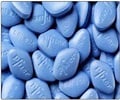A new study claims that compounds related to Viagra, which is already in clinical trials to prevent heart failure, may also counter the disease in a different way.
The study has been published online in the journal Circulation Research.The results hold promise for the design of a new drug class and for its potential use in combination with Viagra or beta blockers.
In heart failure, the heart gradually loses the ability to pump with enough force to supply the body with blood. One reason for lost pumping strength is the mass death of heart muscle cells seen in many heart diseases (e.g. heart attack). Fewer remaining muscle cells must then push around the same amount of blood, and hard working muscles grow. Unlike the healthy bulging of an athlete's bicep, abnormal muscle growth (pathogenic hypertrophy) in diseased hearts thickens chamber walls, slows the heartbeat and causes potentially fatal arrhythmias. Hypertrophy is a major risk factor for the development of heart failure as well.
Recent efforts to reverse hypertrophy include a clinical trial, sponsored by Viagra manufacturer Pfizer, and the National Heart, Lung, and Blood Institute (NHLBI), looking at whether Viagra (sildenafil) can treat moderate heart failure and reduce hypertrophy. Along with increasing blood flow in arteries, Viagra interferes with phosphodiesterases (PDEs), enzymes that break down the messenger molecule called cyclic guanosine monophosphate (cGMP), which would otherwise "put the brakes on" heart muscle cell growth.
Viagra shuts down the PDE5 family in particular, one of 11 PDE families in the body and that include more than 50 individual enzymes. They have proven to be famously good drug targets because each has a unique structure, tissue distribution and role, allowing them to be precisely targeted by drugs for fewer side effects.
In the just-published experiments in heart muscle cells and live mice, researchers found that members of a second PDE family, particularly the PDE1a enzyme, also break up cGMP to control hypertrophy, but not in the same way as Viagra.
Where PDE5 breaks down cyclic nucleotides in response to the vital signaling molecule nitric oxide (NO), PDE1 affects cyclic nucleotide pathways sensitive to Calcium (Ca2+), another major player in cardiac disease, according to the authors.
"Our results suggest that a PDE1a inhibitor alone can shut down abnormal cardiac growth, and when combined with Viagra or beta blockers, may do so in more than one way," said Chen Yan, Ph.D., associate professor within the Aab Cardiovascular Research Institute (CVRI) at the University of Rochester Medical Center, and corresponding author for the study.
"We found a new drug target, that if interfered with, prevents hypertrophy, and where compounds already exist that interfere with it. The compounds used in the study were experimental, but we are already developing drug candidates based on the discovery," the expert added.
Whether combination treatments featuring PDE1 inhibitors will have value in heart failure will not become clear until further animal studies are completed, Yan said. Both PDE1 inhibitors and Viagra lower blood pressure, and may or may not lower it too much in combination. Viagra cannot be used with nitroglycerin for this reason. On the other hand, some patients with heart failure cannot use beta blockers, which also reduce hypertrophy, because the drugs make already weak hearts pump with less vigor. Combining beta blockers with PDE1 inhibitors could potentially enable heart failure patients to take less beta blocker, protecting the contractile power of their heart muscle cells while still averting hypertrophy.
Source-ANI
SRM









